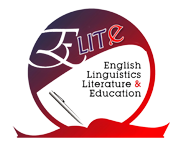Self-Efficacy in Its Influence on Students’ Anxiety in Making English Presentation
 Abstract views: 241
,
Abstract views: 241
,
 PDF downloads: 223
PDF downloads: 223
Abstract
Self-efficacy is individual’s belief towards their own capacity. It affects individual attitudes, emotion, and feeling. A presentation as one of learning strategy can be an instrument to discover EFL self-efficacy level. The purpose of the study is to investigate EFL students’ self-efficacy influence to their anxiety in making English presentation. This study used is quantitative research method with Ex-post-facto design by data collection technique using skala Likert of questionnaire. The results showed that the level of self-efficacy belong to EFL students is moderate to low. The significance difference of self-efficacy to students’ anxiety is also figure out by taking conclusion of students with higher self-efficacy will have lower anxiety especially in making English presentation as the achievement result.
Downloads
References
Afrizal, A. (2018). Permasalahan yang Dialami Lansia dalam Menyesuaikan Diri Terhadap Penguasaan Tugas-Tugas Perkembangannya. Islamic Counseling: Jurnal Bimbingan Konseling Islam, 2(2), 91. https://doi.org/10.29240/jbk.v2i2.462
Ananda, L.R., & Suprihatin, T. (2019). Hubungan Antara Berpikir positif dan Efikasi Diri dengan Kecemasan Berbicara didepan Umum pada Mahasiswa Unissula. Prosiding Konstelasi Ilmiah Mahasiswa Unissula (KIMU) Klaster Humaniora.
Asakereh, A., & Dehghannezhad, M. (2015). Students’ Satisfaction with EFL Speaking Classes: Relating Speaking Self Efficacy and Skill Achievemehnt. Issues in Educational research. 25 (4). 345-363. http://www.iier.org.au/iier25/askereh.html
Bandura. (1997). Self-Efficacy: The Exercise of Control. Newyork: Freeman and Company.
Etherton, K., Steele-Johnson, D., Salvano, K., & Kovacs, N. (2022). Resilience Effects on
students’ Performance and Well Being: The Role of self-Efficacy, Self Set Goals, and
Anxiet. The Journal of General Psychology, 149(3), 279-298. DOI:
https://doi.org/10.1080/00221309.2020.1835800
Firman, A. J., Ni’mah, U., & Asvio, N. (2022). Prototype Curriculum: Consepts and Its Role in Strengthening Character Education After the Covid-19 Pandemic. EJIP: Educational Journal of Innovation and Publication. 10-17. https://ejournal.periexca.org/index.php/ejip/article/view/9
Hamad, M. M., Metwally, A. A., & Alfaruque, S. Y. (2019). The Impact of Using Youtobes and Audio Tracks Limitation YATI on Improving Speaking Skills of EFL Learners. English Language Teaching, 12(6), 191. https://doi.org/10.5539/elt.v12n6p191
Haryanthi, L. P. S., & Tresniasri, N. (2012). Efektivitas Metode Terapi Ego State dalam
Mengatasi Kecemasan Berbicara di depan Publik pada Mahasiswa Fakultas
Psikologi UIN Syarif Hidayatullah Jakarta. INSAN: Jurnal Psikologi. 14(1). 32-40
Hayat, A. A., Shateri, K., Amini, M., & Shokrpour, N. (2020). Relationship Between Academic
Self-Efficacy, Learning Related Emotions, and Metacognitive Learning Strategies
with Academic Performance in Medical Students: A Structural Equation Model. BMC Medicat Education. 20(1), 76. https://doi.org/10.1186/s12909-020-01995-9
Hussain, S. & Khan, sadaquat Ali. (2022). Self-Efficacy of Teachers: A Review of The Literature. Jamshedpur Research Review. 50(1).
Kashinathan, S., & Abdul Aziz, A. (2021). ESL Learners’ Challenges in Speaking English in Malaysian Classroom. International Journal of Academic Research in Progressive Education and Development, 10(2), 983-991.
https://doi.org/10.6007/IJARPED?v10-i2/10355
McNatt, D. B. (2019). Enhancing Public Speaking Confidence, Skills, and Performance: An Experiment of Service Learning. The International Journal of Management Education, 17(2), 276-285. https://doi.org/10.1016/j.ijme.2019.04.002
Nurhasanah, N. (2021). Self-Efficacy dan Berpikir Positif dengan Kecemasan Berbicara di Depan Umum pada Mahasiswa. Jurnal Ilmiah Kesehatan, 10(2), 106-112. https://doi.org/10.52657/jik.v10i2.1477
Paradewari, D. S. (2017). Investigating Students’ Self-Efficacy of public Speaking. International Journal of Education and Research. 5(10). 97-108
Rahmat, H. K., Muzaki, A., & Pernanda, S. (2021). Bibliotherapy as An Alternative to Reduce Students’ Anxiety During Covid-19 Pandemic: A Narrative Review. Proceeding International Conference on Science and Engineering. 4. 379-382
Stankovska, G. Memedi, I., & Dimitrovski, D. (2020). Coronavirus Covid-19 Disease, Mental Health and Psychosocial Support. Society Register, 4(2). 33-48. https://doi.org/10/14746/sr.2020.4.2.03
Trisnaningati, Z. R., & Sinambela, F. C (2021). Self-efficacy, Emotional Regulation Communication Competence and Public Speaking Anxiety Towards Students. ICPSYCHE: International Conference on Psychological Studies. https://doi.org/10.2991/assehr.k.210423.010
Wati, N. L., Yosep, I., Dharmansyah, D., & Ibrahim, M. (2021). The Influence of Public Speaking-Attractive Training to The Public Speaking Anxiety. KnE Life Sciences, 454-461. https://doi.org/10.18502/kls.v6i1.8634
Widhiarso, W. (2012). Tanya jawab tentang Uji Normalitas. Fakultas Psikologi UGM. 1-5
Zhang, X., Ardasheva, Y. & Austin, B. W. (2020). Self-Efficacy and English Public speaking Performance: A Mixed Method Approach. English for Specific Purposes, 59. 1-16. https://doi.org/10.1016/j.esp.2020.02.001
The journal uses an Open Access policy under a Creative Commons Attribution-NonCommercial 4.0 International License. Authors who publish with this journal agree to the following terms:
- Authors retain copyright and grant the journal right of first publication with the work simultaneously licensed under a Creative Commons Attribution License that allows others to share the work with an acknowledgment of the work's authorship and initial publication in this journal.
- Authors are able to enter into separate, additional contractual arrangements for the non-exclusive distribution of the journal's published version of the work (e.g., post it to an institutional repository or publish it in a book), with an acknowledgment of its initial publication in this journal.
- Authors are permitted and encouraged to post their work online (e.g., in institutional repositories or on their website) prior to and during the submission process, as it can lead to productive exchanges, as well as earlier and greater citation of published work.
















